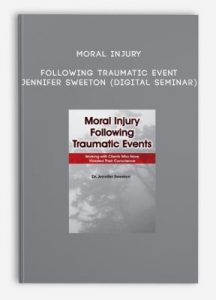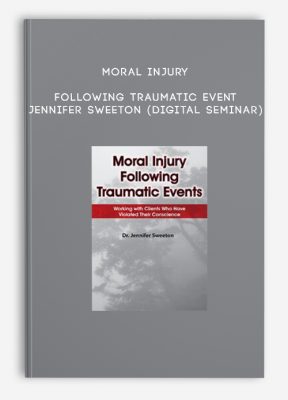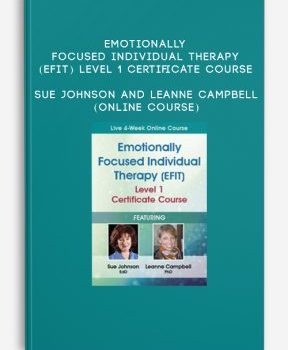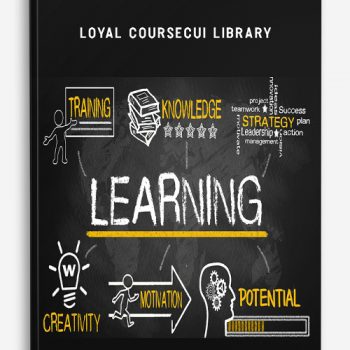
Moral Injury Following Traumatic Events – Jennifer Sweeton (Digital Seminar)
Description
You may not be familiar with moral injury – but you need to be.
Moral injury describes a cluster of symptoms — similar to those associated with PTSD — that result when a person violates their closely held values and beliefs. It can occur when people face traumatic situations where high-stakes decisions must be made.
And today, millions of healthcare workers have been on the frontline of a deadly pandemic. Many have had to make difficult decisions that contradict deeply held beliefs about who gets care and how people should die. It can leave them feeling guilty, unforgivable, depressed and suicidal…and in need of help.
The potential you’ll see morally injured clients in your practice is greater than ever before – are you prepared?
This 2-hour seminar training will give you the clinical guidance and tools you need to:
- Understand moral injury, why it occurs and who it impacts
- Identify moral injury in clients
- More effectively help morally injured clients overcome avoidance and guilt
- Get up to speed on the latest research on treatment
Don’t be caught off-guard when morally injured clients come to you for help!
Purchase today!
Outline:
Moral Injury Defined
- Actions counter to an individual’s moral code
- Guilt and/or shame and/or self-blame
- Failure to act
- Psychological, social, behavioral, and spiritual impacts
- Who experiences moral injury
Why Moral Injury Happens
- Fight, flight, flee survival response
- Loss of context can change behavior (Abu Ghraib and torture)
- Acts of comission or omission in war
- The necessity of making fast, life-ordeath decisions in medical or other contexts (such as COVID)
How to Identify Moral Injury
- Moral Injury Events Scale (Nash et al., 2013)
- Moral Injury Questionnaire (Currier et al., 2015)
- Clinical interview
- Overlap with DSM-5™ PTSD symptoms
Addressing Moral Injury in Clinical Practice: Clinical Insights and the Latest Research
- Guilt vs. shame
- Effective strategies for working through guilt
- Prolonged Exposure, EMDR, Cognitive Processing Therapy, Psychodynamic Psychotherapy, Acceptance and Commitment Therapy
- Impact of Killing Treatment Program (Maguen et al., 2017)
- Trauma-Informed Guilt Reduction (Norman et al., 2014)
- Research and treatment limitations and risks
NLP online course
So what is NLP?
NLP stands for Neuro-Linguistic Programming. Neuro refers to your neurology;
Linguistic refers to language; programming refers to how that neural language functions.
In other words, learning NLP is like learning the language of your own mind!
NLP is the study of excellent communication–both with yourself, and with others.
It was developed by modeling excellent communicators and therapists who got results with their clients.
NLP is a set of tools and techniques, but it is so much more than that.
It is an attitude and a methodology of knowing how to achieve your goals and get results
Preview Information:
Original Page
Add more Author:
Dr. Jennifer Sweeton is a licensed clinical psychologist, author, and internationally-recognized expert on trauma, anxiety, and the neuroscience of mental health. Dr. Sweeton has been practicing EMDR for nearly a decade and has treated a variety of populations using EMDR and other memory reconsolidation approaches, including combat veterans, individuals with PTSD and complex trauma, and those suffering from treatment-resistant anxiety.
She completed her doctoral training at the Stanford University School of Medicine, the Pacific Graduate School of Psychology, and the National Center for PTSD. Additionally, she holds a master’s degree in affective neuroscience from Stanford University, and studied behavioral genetics at Harvard University.
Dr. Sweeton resides in the greater Kansas City area, where she owns a group private practice, Kansas City Mental Health Associates. She is a past president of the Oklahoma Psychological Association and holds adjunct faculty appointments at the University of Kansas School of Medicine. She is the president-elect of the Greater Kansas City Psychological Association. Dr. Sweeton offers psychological services to clients in Oklahoma, Kansas, and internationally, and is a sought-after trauma and neuroscience expert who has trained thousands of mental health professionals in her workshops.
Speaker Disclosures:
Financial: Jennifer Sweeton is in private practice. She has an employment relationship with the Oklahoma City VAMC. Dr. Sweeton receives a speaking honorarium from PESI, Inc.
Non-financial: Jennifer Sweeton has no relevant non-financial relationship to disclose.
More Course: NLP – HYPNOSIS – PHILOSOPHY
Outstanding Course:Design and Installation of a Motivation Strategy – Elements of NLP – Module 01 by Chris Mulzer













Reviews
There are no reviews yet.